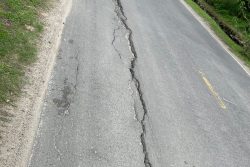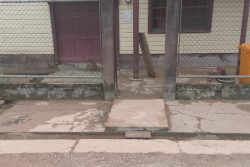As the halfway point in this administration’s life approaches, the jubilation, nay euphoria, over the spending that is now possible with the country’s oil revenues is easily discerned. There will be a new high-rise bridge – without any environmental study – over the Demerara, another possibly over the Corentyne if negotiations with the Surinamese can be safely concluded and the biggest and costliest promise of all – the halving of power bills by the use of polluting natural gas to create energy.
There is also substantial spending on social programmes and initiatives all of which can be justified except that they reflect discomfiting discretionary powers and are not embedded in an overall development programme that has been sanctioned by Parliament along with the best efforts to involve the opposition and civil society. Many of the initiatives – particularly the cash handouts – are also at risk of corrupt behaviour and it isn’t at all clear that the regulatory and law enforcement agencies are empowered or motivated to scrutinise these distributions. Contract awards – in huge sums – have also come under examination. Companies with no track record in construction or poor ones have been bafflingly favoured by evaluation committees under the procurement board.
While this government has the full authority to proceed with spending plans that have been approved by Parliament, it, of course, also has an equal obligation to expend prudently in recognition of the risks attendant to the oil and gas industry and the moral dilemma of super-charging the release of carbon fuels at a time of grave danger to the planet from global warming. It also must properly factor in intergenerational equity and weigh carefully the obligation to transition to clean fuels even if it means leaving oil and gas in the ground.
These decisions fall to those currently in charge. It is worth pointing out that none of those currently at the helm: President Ali, Vice President Jagdeo or Natural Resources Minister Bharrat has had any role at all to play in securing the largesse that now accrues from oil extraction. Counter-intuitively that honour belongs to the very austere and frugal President Janet Jagan who was not a supporter of the exploitative behaviours of multinationals like ExxonMobil but who may have seen in the 1999 pre-oil deal an opportunity to erect a bulwark against our avaricious and destabilising neighbour to the west. The tide that the President and his government rises on was therefore not of their doing and they must be mindful of their stewardship of these monies.
Where such mindfulness was expected it has not been seen. Nearly 27 months in office, the government is yet to promulgate legislation for a Petroleum Commission to regulate and oversee the ever sprawling reach of ExxonMobil and its partners beneath Guyana’s Atlantic waters. The Ali administration steadfastly refuses to take the minutest step to bring ExxonMobil to the negotiating table to rectify the horrendous 2016 Production Sharing Agreement even with the scandalous evidence of the profits being generated by the oil major – the highest in its history in the last quarter – and its partners like Hess and the myriad subcontractors. This and the securing of the protection of the country’s environment from the possibility of a devastating oil spill or worse are the arenas in which the current government and its leading lights have full sway. They have failed utterly thus far.
All of this is to say that the last couple of weeks have also not been good for the government as it relates to the conduct of its officials, good governance and the rule of law, behaviour redolent of that which led to its removal at the 2015 general elections. It should be a sobering wake-up call for it and the PPP as the midpoint of its term beckons.
In no particular order, there was the premature release of the decision by the Caribbean Court of Justice (CCJ) on the Facebook page of the Attorney General Anil Nandlall SC. Whomsoever was responsible it was an act of crass triumphalism, wanting to trumpet the fact that the court had comprehensively ruled against not only APNU+AFC but also the Guyana Court of Appeal. Couldn’t that immature exuberance have been contained for one or two days? The reckless act has brought the country and the office of the Leader of the Bar into disrepute and the consequences will not be known until the CCJ finally rules.
As the CCJ said: “The premature, unauthorised disclosure of the result of the litigation is inexcusable. It betrays the confidence of the Court and, given the fact that it emanated from the Facebook account of the person holding the office of the Attorney General, it serves to bring the entire administration of justice into disrepute”.
The PPP/C administration also has to be held accountable for the repugnant behaviour of its High Commissioner in New Delhi, Charrandass Persaud. The words uttered to an animal rights activist have brought shame to this country and crystallises the view that the men in these parts have displayed the deepest disdain for women and gotten away with it. That image would not have been ameliorated at all by the fact that President Ali did not strongly rebuke Mr Persaud in his video statement and never once used the word “recall” which has particular connotations in the world of diplomacy. Further, the Ministry of Foreign Affairs knew of a serious complaint against Mr Persaud but apparently conveniently left it in the hands of the authorities in New Delhi to dispose of. On first hearing of the complaint, Takuba Lodge should have summoned Mr Persaud back to Georgetown to at least provide him an opportunity to defend this indefensible conduct. Fourteen months elapsed before the scandal eventually blew up in its face.
Friday’s arrest of an attorney by the Special Organised Crime Unit (SOCU) while she was giving time-hooured advice to her client is another hall of shame event for the government. SOCU has had one of the most chequered histories of all law enforcement units in this country and how it has not been disbanded is not a minor puzzle. The arrest of Tamieka Clarke was sufficiently disastrous to warrant immediate recoil by the authorities and the only matter of interest to those defending the rule of law is what will become of the offending officer who had apparently been accorded carte blanche to do as he pleased as evidenced by the testimony of retired Assistant Commissioner of Police Slowe in a letter in yesterday’s Sunday Stabroek. The odds are highly in favour of nothing being done.
Then there is the case of Ossie Rodgers who brutally attacked Bath supermarket worker Kamala Devi Bharrat but is yet to be charged. For those who don’t know, Mr Rodgers has had a close association with this government and some of its senior functionaries and that more than likely explains why no action has been taken against him and why Ms Bharrat has been made to feel as if she was the guilty party. Progress in this matter is still awaited.
Also egregious was the use of a Skeldon Hospital ambulance for the smuggling of chicken. Skeldon is one of the strongholds of the PPP/C and this particular abomination has been linked to a leading local government official in the area. What was a straightforward investigation has no doubt become mired in the marsh of political interference. Results are also awaited here.
The country’s oil wealth is fuelling arrogance and unaccountability. Under the Westminster system one would have hoped that there would have been robust measures by the opposition to help rein in extreme behaviours. To date, the opposition – all of it – has been uninspired and unproductive and this has further emboldened the government. APNU in particular remains handicapped by the cloud over the malevolent attempt in March of 2020 to rig the general elections in its favour – with the use of a bedsheet and all.
This state of affairs increases the onus and burden on civil society to help to right the unsteady ship of state. Can it deliver?






